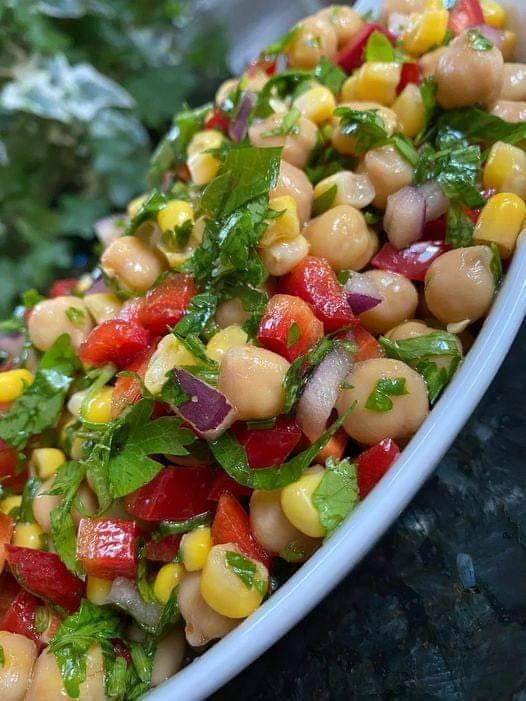Embark on a journey of wholesome and vibrant flavors with the Chickpea Salad, a culinary masterpiece that transforms humble chickpeas into a delightful symphony of taste and texture. This salad not only celebrates the versatility of chickpeas but also introduces a medley of fresh vegetables, herbs, and zesty dressings, creating a dish that is not just nutritious but a celebration of colors, crunch, and creativity.
At the heart of this salad is the mighty chickpea, a nutrient-packed legume that forms a hearty and protein-rich base. Known for its nutty flavor and robust texture, chickpeas provide a satisfying bite, turning this salad into a substantial and fulfilling meal. Whether roasted for added crunch or left tender in their natural state, chickpeas serve as the perfect canvas for a multitude of flavors.
The Chickpea Salad is a testament to the art of balance. Crisp cucumbers, juicy tomatoes, and colorful bell peppers add a burst of freshness, while red onions and olives contribute a savory depth. This diverse array of vegetables not only creates a visual feast but also provides a spectrum of flavors that play off the nuttiness of chickpeas, offering a symphony of taste in every mouthful.
Herbs, such as parsley and mint, add a fragrant and invigorating quality to the Chickpea Salad, elevating it from a simple side dish to a culinary experience. The combination of fresh, aromatic herbs with the robustness of chickpeas creates a dynamic flavor profile that is both refreshing and satisfying, making this salad a perfect addition to any meal or a standalone dish for a light and nutritious lunch.
The dressing, often a vibrant concoction of olive oil, lemon juice, and a dash of spices, ties all the elements together, providing a zesty and tangy finish. This dressing not only enhances the overall taste but also contributes to the health-conscious nature of the salad, making it a mindful choice for those seeking a delicious yet nutritious option.
What sets the Chickpea Salad apart is its versatility. Whether enjoyed as a refreshing side dish at a summer barbecue or as a protein-packed lunch for a busy workday, this salad accommodates a range of dietary preferences and occasions. It can be customized with additional ingredients such as feta cheese, avocados, or quinoa, allowing for endless variations to suit individual tastes.
Beyond its culinary attributes, the Chickpea Salad embodies the spirit of wellness, offering a wholesome and satisfying meal that nourishes the body and delights the palate. Whether you are a committed health enthusiast or someone seeking a delicious introduction to plant-based eating, this salad invites you to savor the goodness of chickpeas and the abundance of fresh, vibrant ingredients in every forkful, proving that nutritious can be synonymous with delicious.
Gut Health:
Plant-based diets are often associated with improved gut health due to the high fiber content from fruits, vegetables, and whole grains. A healthy gut microbiome is linked to better digestion and overall well-being.
Anti-Inflammatory Properties:
Many plant-based foods have anti-inflammatory properties, which can help in reducing inflammation in the body. Chronic inflammation is associated with various health issues, and a vegan diet may contribute to its prevention.
Sports Performance:
Contrary to the misconception that vegan diets lack protein, many successful athletes follow plant-based diets to enhance their performance. Plant-based proteins can support muscle building and recovery.
Reduced Risk of Foodborne Illnesses:
Plant-based diets eliminate the risk of foodborne illnesses associated with the consumption of undercooked or contaminated animal products.
Economic Impact:
A vegan diet can be more economical as plant-based protein sources tend to be cost-effective compared to some animal products. It may be a budget-friendly option for individuals or families.
Mindful Eating:
Adopting a vegan lifestyle often promotes mindful eating. Being more conscious of food choices and sources can lead to a healthier relationship with food and a greater appreciation for the environmental impact of dietary decisions.
Preservation of Biodiversity:
The expansion of animal agriculture often leads to habitat destruction and loss of biodiversity. Choosing a vegan diet supports the preservation of ecosystems and the protection of various species.
Culinary Diversity:
Veganism introduces individuals to a diverse range of cuisines and ingredients from around the world. Exploring plant-based cooking can be a culinary adventure, embracing flavors and techniques from different cultures.
Reduced Antibiotic Resistance:
The use of antibiotics in animal farming contributes to the rise of antibiotic-resistant bacteria. Opting for a vegan diet can be a way to reduce the demand for such practices and promote responsible antibiotic use.
Cruelty-Free Beauty and Personal Care:
Veganism extends to beauty and personal care products. Choosing cruelty-free, vegan alternatives ensures that your lifestyle aligns with ethical choices beyond just dietary preferences.

